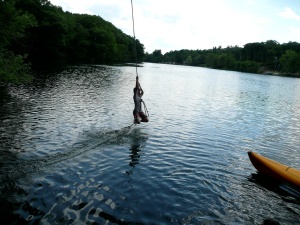
The child that is born on the Sabbath day is bonny and blithe, and good and gay.
Sunday’s child is thus the child of repose—and so whether you’re looking to take your “Sabbath,” your sabbatical or just a nap, Sunday’s child is the kid for you.
Children are great teachers—every day of the week. And the idea of a child born (i.e. labored into being) on a day of no labor (given that the Bible story says that painful childbirth is a punishment for tasting from the tree of knowledge…) suggests a redemptive aspect of Sunday’s child.
Why might “honoring the Sabbath and keeping it holy” be a “commandment” for living? This notion came down long before labor laws and the industrial revolution, and perhaps it serves us to consider the non-religious potentiality in a pause. While we value a work ethic, work without break threatens to render all work meaningless; like ingesting without digesting, life cannot nourish us if we never slow down enough to take it truly in.
A traditional yoga practice ends in “shivasana,” (or “corpse pose”) where the yogi just lies on their back in total relaxation, working to empty the mind; this is when all the work of the preceding poses can be absorbed, revitalizing our bodies, minds and spirits. Thus Sunday’s child carries the torch for taking a break and letting it all go.
Yet being still can be a challenge for some of us, as the things that might otherwise be kept at bay by our busy schedules (such as feelings of loneliness, or emptiness) can come looming up to meet us when we stop… and yet if we can learn to successfully be empty, we ironically increase our ability to be full and abundant.
Beyond an archetypal creation story followed by a cosmic caesura (i.e. God “resting” after all that work of creating the universe) Sunday’s child may help us realize that our kids are like little Buddhas, achieving stillness at their block building or in the fantasy world enveloping them in the tub, and offering to help us return to our primordial state of authentic being (and not only “doing”).
Martin Buber, who claimed that relating to the sacred in each other is “the essential deed” of life, must be one of Sunday’s children.
So let’s dedicate today to hanging out, to relating by seeing the subtle beauty in what just is—free of fear that something is all wrong, free of desire to change things. This means not improving ourselves or our children, but trusting that today is a good day to take the world as we find it—in honor of being our best Selves and out of love and gratitude for all our collective children.
Namaste, Bruce


